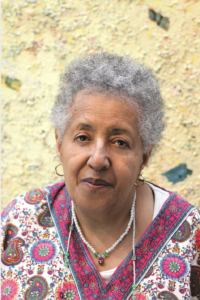Howardena Pindell is a painter and mixed media artist, as well as a professor at State University of New York at Stony Brook. She earned a BFA from Boston University in 1965 and an MFA from Yale University in 1967. Pindell worked at the Museum of Modern Art from 1967 to 1979, where she held several positions, including exhibit assistant, curatorial assistant, and associate curator. She cofounded the A.I.R. Gallery in 1972. Pindell has taught in the Department of Art at State University of New York at Stony Brook since 1979.

Pindell’s interview is the first in a series of oral histories with prominent African American artists for the Getty Research Institute’s (GRI) African American Art History Initiative. These oral histories complement the GRI’s ongoing work to collect, preserve, and interpret the art and legacies of these artists.
Pindell was born in 1943 and grew up in segregated Philadelphia. Thanks to the support of her parents and her demonstrable talent, Pindell had a great deal of exposure to art early in life. She went on to study at Boston University and Yale University, then moved to New York in the 1960s. In New York Pindell began working at the Museum of Modern Art while also continuing to paint. She recalled, “…I was working five days a week, and I was used to having natural light, and I didn’t have natural light.” As natural light is so important to a painter, and her work schedule cut into daylight hours, Pindell started experimenting with mixed media in these years – a practice she has continued to expand.
Perhaps Pindell’s best-known work is Free, White and 21, a video performance piece from 1980 that is a commentary on her experiences with racism and sexism. Listen to Pindell recount the logistics of creating the piece.
Free, White and 21 also relates to many of Pindell’s ongoing challenges with racism in the women’s movement and the art world at large. Though she was a cofounder of A.I.R. Gallery in 1972 – the first artist-run gallery for women in the United States – as an African American woman, she often felt marginalized in discussions about how to expand opportunities for women artists.
Pindell also spoke at length about her work as a professor of art, and her approach to teaching. Having been academically trained, she worked with many different professors and knew what teaching styles she would and would not emulate. Further, she saw working with students as important to her practice as a working artist. Pindell explained, “I think teaching helps me a lot, just so it keeps me fresh, because I can help the younger students – and in some cases, older students – with their work with formal issues. That keeps me informed about how I should think about my work, as well.”
Pindell’s story highlights the challenges of being a working artist, the importance of teaching others, fighting racism and sexism in the art world and beyond, as well as the long-overdue recognition of African American artists.
To learn more about Howardena Pindell’s life and work, check out her oral history!